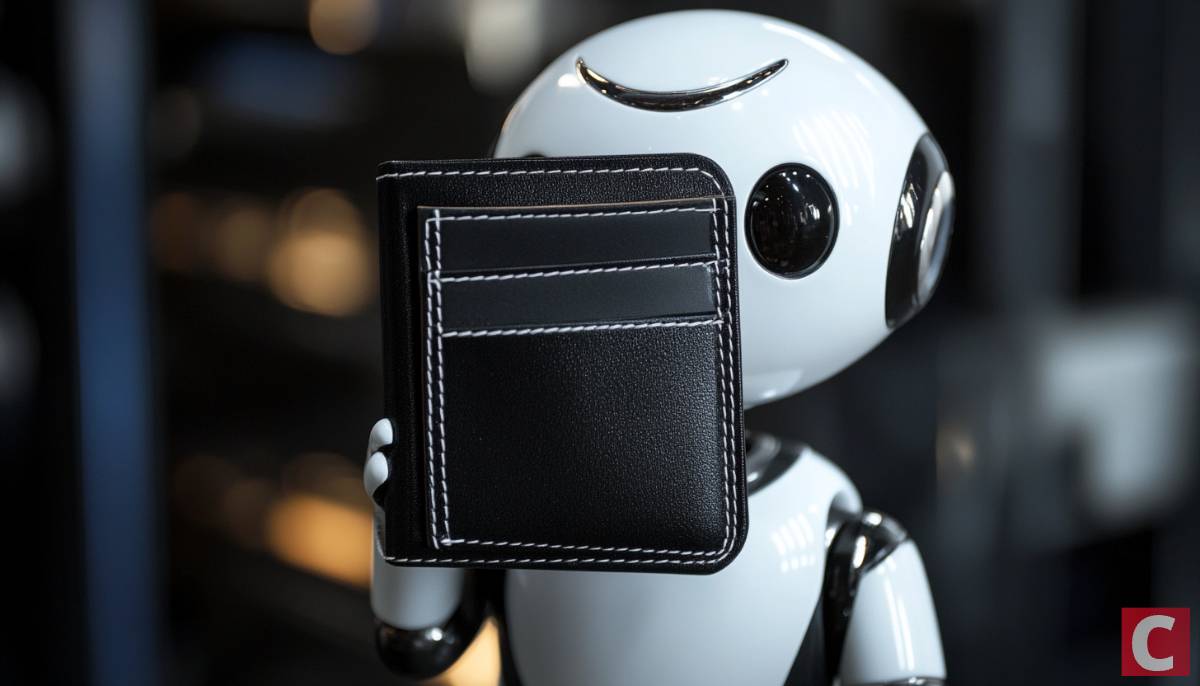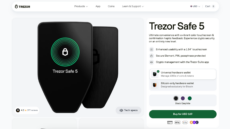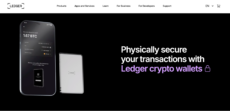Solana has rapidly become a cornerstone of the Layer 1 blockchain landscape, known for its speed, low fees, and robust developer a...
Best Crypto Wallets 2025 – Top Bitcoin Wallets Compared
| Updatedby Tony Frank · 32 mins read

This guide helps beginners choose the right wallet provider for their needs. We rank and review the 10 best crypto wallets for 2025.
Disclaimer: Cryptocurrencies are considered high-risk investments. This article serves for informational purposes only. It should not be perceived as financial advice. By reading our website, you acknowledge and accept our terms and conditions. Our content may include affiliate links, through which we may earn a commission.
Crypto investors need a secure and convenient wallet to store their crypto assets. Many options exist, from mobile apps and desktop software to cold wallet solutions. Custodianship also needs to be considered, meaning a choice between third-party or decentralized storage where only you hold the keys to your wallet.
This guide helps beginners choose the right wallet provider for their needs. We rank and review the 10 best crypto wallets for 2025, handpicking options from each category. Read on to learn how wallets work, what factors to consider, and how to ensure safety.
Key Takeaways on Crypto Wallets
- Crypto wallets store digital assets like Bitcoin and Ethereum, with device types including desktop software, mobile apps, web browsers, and hardware devices.
- Non-custodial wallets are recommended as they provide complete control of the digital assets being stored.
- In contrast, third parties manage custodial wallets, so transactions require authorization before approval.
- While wallets are primarily used to send, receive, and store cryptocurrencies, many offer additional features like credit card purchases, instant swaps, and staking.
- Irrespective of the wallet type, the most important factor is security. Look for safety nets like two-factor authentication and biometrics for a secure experience.
10 Best Crypto Wallets to Use in 2025
Here’s a curated list of the best crypto wallets for investors in 2025:
- Best Wallet – The Overall Best Crypto Wallet App for iOS and Android Users
- Exodus – Great Choice for Storing Digital Assets on Windows or Mac Software
- MetaMask – The Most Popular Browser Wallet for Ethereum and EVM-Based Tokens
- Trezor Safe 5 – Best Hardware Solution for Investors With a Security-First Mindset
- Coinbase Wallet – A Good Option for First-Timers Seeking Non-Custodial Storage
- Electrum – The Best Open-Source Desktop Wallet for Safely Storing Bitcoin
- Ledger Nano S Plus – Get a Basic Yet Highly Secure Cold Wallet for Just $79
- Zengo – Innovative Crypto Wallet App Leveraging Multi-Party Computation Security
- Phantom – Highly Rated Hot Wallet for Storing and Trading Solana Tokens
- Trust Wallet – Globally Popular Wallet App Supporting Over 100 Network Standards
Reviewing the Best Bitcoin Wallets
Security, supported blockchains, user-friendliness, fees, and device types are just some considerations to make when choosing the best crypto wallet.
The following reviews cover everything you need to know about the top providers. Read on to make a smart and informed choice.
1. Best Wallet – Our Top Wallet Pick for Storing Cryptocurrencies on a Mobile Device
Best Wallet is the overall best cryptocurrency wallet for mobile users. It offers a non-custodial wallet app for iOS and Android, with users getting the perfect blend between convenience and security. For instance, the wallet’s unique private key is encrypted and stored on the mobile device, and a 12-word backup passphrase ensures recovery at any time.
Best Wallet users can also activate two-factor authentication and biometrics for enhanced safety. Another feature is Best Wallet’s support for over 60 network standards, allowing users to store millions of different cryptocurrencies in one place. Bitcoin, Ethereum, XRP, Litecoin, Dogecoin, Solana, BNB, and Arbitrum are just a few examples.
If you’re holding secondary tokens (e.g., ERC20 tokens on Ethereum), these can be added to the Best Wallet balance in seconds. Best Wallet is free to use when storing and receiving cryptocurrencies, with a small network fee for outgoing transfers.

Crucially, Best Wallet isn’t just a non-custodial wallet — it doubles as an entire Web 3.0 ecosystem. For example, users can swap tokens instantly via decentralized exchanges.
Cryptocurrencies can also be purchased with local currencies via Visa, PayPal, and more. The Best Wallet launchpad is also popular. Users can invest in pre-listing tokens from their wallet balance at a discounted rate. Overall, Best Wallet’s extensive ecosystem makes it the best option for 2025.
Pros
- Store cryptocurrencies from 60+ networks
- Non-custodial access ensures complete ownership and control
- Privacy-first measures with no personal information needed
- Buy, sell, and swap tokens without leaving the app
- Offers the ideal balance between robust security and convenience
Cons
- Less established than many wallet providers
- The browser extension is still being developed
2. Exodus – Free and Secure Crypto Storage via User-Friendly Desktop Software
The next option is Exodus, a great choice for investors preferring a desktop-based experience. Exodus, which launched in 2015, offers desktop software for Windows and Mac. Having tested both operating systems, Exodus is user-friendly, secure, and ideal for diversified portfolios. It supports millions of cryptocurrencies from over 50 networks, including custom tokens.
This includes market leaders like Bitcoin, Ethereum, and Solana, not to mention meme coins like Dogecoin, Shiba Inu, and Bonk. Exodus’s desktop software also offers investing insights. Users can see values for each crypto purchase or the entire portfolio, displayed in the preferred currency. Valuations are based on real-time data feeds for enhanced accuracy.

Exodus also offers near-instant crypto investments with credit cards and e-wallets. Select cryptocurrencies can be staked for passive rewards, including Cardano and Cosmos. Do note that while Exodus is our top pick for desktop users, it also offers a mobile app for iOS and Android. A browser extension is also available, albeit with poor user reviews.
Pros
- The best crypto wallet for Windows and Mac devices
- Send, receive, and store tokens from over 50 networks
- Basic features are free to use
- Private keys are encrypted on the user’s laptop or PC
- Established since 2015
Cons
- The browser extension is rated 3.5/5 on Chrome
- Credit card purchases have high fees
3. MetaMask – Top-Rated Hot Wallet Extension With Over 100 Million Users Worldwide
Next is MetaMask, one of the best crypto wallets for browser-based experiences. MetaMask comes as a free extension for Chrome, Firefox, and Safari, boasting over 100 million downloads since it launched in 2016. However, we should mention that MetaMask is best-suited for storing Ethereum and BNB Chain cryptocurrencies.
MetaMask is compatible with any ERC20 and BEP20 token, plus cryptocurrencies operating on layer-2 networks like Base and Blast. There’s no support for Bitcoin, XRP, Litecoin, and other crypto assets. Nonetheless, MetaMask has a great reputation for user-friendliness. It takes seconds to get started and private keys are accessible only by the user.

MetaMask also offers staking features, although fees are high, and only Ethereum and Polygon are supported. Instant token swaps are also possible, with fees paid in the user’s preferred token. This ensures ETH or BNB isn’t required to cover network charges. Other features include NFT compatibility, fiat purchases, and a newly launched prepaid card from MasterCard.
Pros
- The most popular option for browser-based wallets
- Supported browsers include Chrome, Firefox, and Safari
- Token swap fees can be covered by existing wallet balances
- One of the most user-friendly wallets for beginners
- Also comes as a mobile app for iOS and Android
Cons
- No support for Bitcoin, Litecoin, and other popular cryptocurrencies
- High fees when buying and selling tokens with fiat money
4. Trezor Safe 5 – Multi-Currency Hardware Wallet With Institutional-Grade Security
Trezor Safe 5 is one of the most secure crypto wallets around, although the trade-off is convenience. This pocket-sized device is the latest Trezor model, offering an easier transacting experience via a 1.54” touchscreen. Private keys are encrypted on the device, which is never connected to the internet.
Even lost or stolen devices come with safeguards, with users recovering the wallet funds remotely via the backup passphrase. What’s more, crypto transactions must be confirmed by entering a PIN on the Trezor Safe 5 device, meaning it’s useless to thieves. Unlike many hardware wallets, the most popular cryptocurrencies are supported. This includes everything from Bitcoin, BNB, and Solana to Shiba Inu, Dogecoin, and Ethereum.

In terms of fees, Trezor Safe 5 costs $169. The Trezor Model One and Trezor Safe 3 are cheaper, costing $49 and $79, respectively. All three options offer a secure storage experience, so it all depends on which features and functionality you need.
Pros
- One of the best wallets for crypto security
- Private keys are encrypted and stored on a hardware device
- Crypto transactions must be confirmed by physically entering a PIN
- Lost or stolen devices can be recovered remotely via the backup passphrase
- Supports the most popular crypto networks under one roof
Cons
- Cheaper Trezor alternatives are available
- High fees when trading cryptocurrencies via Trezor Suite
5. Coinbase Wallet – One of the Most User-Friendly Non-Custodial Crypto Wallets
Coinbase Wallet is one of the best Bitcoin wallets for beginners, especially those exploring non-custodial storage for the first time. Unlike the Coinbase exchange, this crypto wallet offers a decentralized experience, Meaning no-one can access the private keys. There are no know-your-customer (KYC) steps either, ensuring complete privacy.
Coinbase Wallet comes as a free mobile app for iOS and Android. It supports Bitcoin, Solana, Dogecoin, and all EVM-compatible networks, including BNB Chain, Polygon, and Optimism. It’s also a good choice for storing Base cryptocurrencies, the layer-2 network backed by Coinbase. Custom tokens can also be added, provided they’re compatible with a supported network.

In terms of features, Coinbase Wallet comes preinstalled with popular decentralized applications (dApps) like OpenSea, SushiSwap, and ENS. It’s also a solid option for storing and viewing NFTs. Coinbase Wallet also supports fiat services, with gateways including Coinbase and Transak. However, using this feature means losing your anonymity.
Pros
- The best crypto wallet for beginners exploring non-custodial storage
- Only the user has access and control of the private keys
- Supports Bitcoin, Ethereum, Dogecoin, Solana, and EMV-compatible networks
- Completely free to use with no markups on gas fees
- Comes preinstalled with Sushiswap, OpenSea, and other popular dApps
Cons
- Buying crypto with fiat money means the wallet is no longer anonymous
- No assistance from Coinbase if the wallet balance is compromised
6. Electrum – One of the Original Bitcoin Desktop Wallets Aimed at Long-Term Holders
The next option is Electrum – a free crypto wallet exclusively for storing Bitcoin. Electrum comes without features like token swaps and fiat purchases. It was designed for long-term Bitcoin investors seeking a safe way to build wealth. All without any connection to third-party custodians.
Electrum supports Windows, Mac, and Linux software. All versions are open-source and free to download. The user’s private key is securely stored on the desktop device. Crypto security features include multisig wallets, requiring outgoing transactions to be confirmed on two or more devices.

In addition to backup passphrases, Electrum ensures safety via decentralized servers. This means zero downtime, with transactions directly indexed and broadcast to the Bitcoin blockchain.
No fees are charged for receiving and storing Bitcoin, with only the network fee required for outgoing transfers. Naturally, Electrum won’t be suitable if you’re invested in other cryptocurrencies, considering its lack of support for non-Bitcoin assets.
Pros
- A trusted self-custody Bitcoin wallet for desktop users
- Open-source software for Windows, Mac, and Linux
- Multisig security features and view-only balances
- Decentralized servers ensure no downtime
- Completely free to use
Cons
- Doesn’t support any cryptocurrencies other than Bitcoin
- No Web 3.0 features like token swaps or savings accounts
7. Ledger Nano S Plus – Budget-Friendly Hardware Wallet With Over 15,000 Tokens Supported
Another crypto hardware wallet to consider is Ledger Nano S, now available for an affordable $79 plus shipping. More advanced Ledger models with increased functionality are available, but the Nano S Plus is just as secure. It comes as a small and easily transportable device, with the private keys stored inside.
Transactions are confirmed by connecting a USB-C cable to a desktop or mobile device, before entering a PIN directly on the Ledger Nano S Plus. Moreover, there’s no risk of online hacks or viruses, as Ledger Nano S Plus is never connected to the internet. Users are shown their backup passphrases when getting started, which is required if the Ledger hardware wallet itself is lost.

These security features justify the price tag, especially considering the wide network compatibility. Over 15,000 cryptocurrencies are supported, including Bitcoin, Solana, Ethereum, TRON, and BNB. The main drawback is Ledger Live, the wallet’s native software. It charges high fees for side features like token swaps, staking, and fiat purchases.
Pros
- Pay just $79 for a top-rated hardware wallet
- Avoid internet threats like viruses and malware
- Supports over 15,000 cryptocurrencies
- Stolen wallets are recoverable via the backup passphrase
Cons
- Additional features like fiat purchases attract high fees
- Bluetooth isn’t supported
8. Zengo – Multi-Party Computation Wallet With Split Private Keys and 3FA Backup
Zengo is a non-custodial wallet with a unique security framework. It replaces traditional seed phrases with Multi-Party Computation (MPC) technology, removing any single points of failure. The user’s private key is split, with one part stored on the respective mobile device. The other part is held on trusted servers. This means that a hacked segment of the key is useless without the other.
In addition, Zengo offers three-factor authentication for wallet recovery. This is required if you no longer have access to the smartphone storing the Zengo wallet app. The three security steps are biometrics (e.g., FaceLock), a recovery file stored on the cloud (e.g., Google Drive), and email verification.

Wallet access is recovered once all three steps are completed. Zengo is free to use for basic features, such as sending, receiving, and storing cryptocurrencies. It also offers premium subscriptions for increased functionality, including a Web 3.0 firewall and theft protection. Zengo supports hundreds of cryptocurrencies, including Bitcoin, Ethereum, BNB, and Dogecoin.
Pros
- The best crypto wallet for MPC security features
- Private keys are split and distributed, ensuring no single point of failure
- Wallets can be recovered via email, biometrics, and cloud storage
- Great reviews in the public domain
Cons
- Doesn’t support the Solana network
- Non-basic features require a paid subscription
- Only available as a mobile app
9. Phantom – Free Mobile and Browser Wallet for the Solana Ecosystem
Phantom is one of the best crypto wallets for Solana ecosystem traders. It’s compatible with all tokens on the SPL standard, amounting to millions of meme coins. From Bonk and dogwifhat to ai16z and Popcat, Phantom is ideal for finding that next 100x gem. It seamlessly connects with Raydium and Jupiter, the leading decentralized exchanges (DEXs) for SPL tokens.
For example, suppose you’re using Phantom to store SOL. You can immediately swap SOL for a newly launched meme coin without ever revealing your identity. Phantom also offers portfolio insights, although the prices and valuations are sometimes off from real-time spot rates. There’s also support for NFTs, including viewing, storing, and trading them.

While Phantom is the best crypto wallet for Solana, it also supports Bitcoin, Ethereum, and Sui. It’s also compatible with layer-2 networks like Base and Polygon. However, there’s no support for Dogecoin, Litecoin, XRP, and other legacy projects. Nonetheless, Phantom is highly rated, with a 4.6/5 and 4.7/5 score on Google Play and the App Store, respectively.
Pros
- One of the best hot wallets for storing and trading Solana meme coins
- Easily connect with the Raydium and Jupiter DEXs
- Also compatible with Bitcoin, Ethereum, Sui, Base, and Polygon
- Highly rated on both app stores
Cons
- Limited support for legacy coins like XRP and Dogecoin
- Also has a browser extension, but the user experience is subpar
- Extortionate fees when buying crypto with a credit card
10. Trust Wallet – One of the Best Crypto Wallets for Managing a Diversified Portfolio
Last on this list is Trust Wallet, one of the best crypto wallet apps for managing diversified portfolios. Almost every blockchain and layer-2 network in existence is supported, with no requirement to manually add new token standards. For example, even newer ecosystems like Sui, Base, Blast, and Mantle come preinstalled.
This is in addition to the market leaders like Bitcoin, BNB Chain, Solana, and Ethereum. Trust Wallet can also be used to access any Web 3.0 dApp, from Uniswap and the Sandbox to Aave, Raydium, and Rarible. WalletConnect is also supported, allowing dApp connections by scanning the respective QR code.

Security is also a plus point. Trust Wallet is protected by encrypted private keys, stored on the mobile device. A PIN or biometrics is required whenever the app is opened. Two-factor authentication is, however, lacking. Trust Wallet supports several third-party services for additional fees, including instant conversions and fiat purchases.
Pros
- Supports over 100 blockchains and layer-2 networks
- Security features include biometrics and encrypted private keys
- Offers a user-friendly experience from the get-go
- Trusted by over 200 million users
Cons
- Limited support for legacy coins like XRP and Dogecoin
- Also has a browser extension, but the user experience is subpar
- Extortionate fees when buying crypto with a credit card
Top Crypto Wallets Compared
The best crypto wallets in 2025 are compared below:
| Crypto Wallet | Wallet Type | Device Type | Supported Chains | Price | Exchange Integration |
| Best Wallet | Hot | Mobile | 60+ including Bitcoin, Ethereum, and Solana | Free | Yes – native DEX |
| Exodus | Hot | Desktop, mobile, browser extension | 50+ including Bitcoin, BNB Chain, and XRP | Free | Yes – third-party support |
| MetaMask | Hot | Browser extension, mobile | Ethereum and all EVM networks including Base and Linea | Free | Yes – third-party support |
| Trezor Safe 5 | Cold | Hardware | 20+ including Bitcoin, Solana, and Cardano | $169 | Yes – third-party support |
| Coinbase Wallet | Hot | Browser extension, mobile | Bitcoin, Ethereum, Solana, Dogecoin, and all EVM networks | Free | Yes – third-party support |
| Electrum | Hot | Desktop, mobile (Android only) | Bitcoin | Free | No |
| Ledger Nano S Plus | Cold | Hardware | 30+ including Bitcoin, XRP, and Litecoin | $79 | Yes – third-party support |
| Zengo | Hot | Mobile | Bitcoin, Dogecoin, TRON, Ethereum, and several EVM networks | Free | Yes – third-party support |
| Phantom | Hot | Browser extension, mobile | Solana, Bitcoin, Ethereum, Sui, and several EVM networks | Free | Yes – third-party support |
| Trust Wallet | Hot | Browser extension, mobile | 100+ blockchains and networks including Bitcoin and Ethereum | Free | Yes – third-party support |
What is a Crypto Wallet?
Crypto wallets are required when investing in and storing digital assets. Whether you’re interested in Bitcoin, Dogecoin, or Solana, a secure wallet is a must. You’ll not only ensure safe storage but also access to the blockchain ecosystem. This is because wallets are also used to freely send and receive cryptocurrencies.
It’s like having a bank account but for digital assets rather than traditional money. However, the key difference, assuming you select a “non-custodial” wallet (more on this later), is that centralized third parties are unable to access the funds. This ensures complete control of any purchased cryptocurrencies, including transacting and connecting to dApps.
Without an online wallet, investments must be stored with a custodian, such as an exchange like Binance or a retail-friendly broker like Webull. These platforms manage private keys on behalf of their users, so you can’t make wallet-to-wallet transfers without their approval. This counterparty risk is eliminated when using a non-custodial wallet.
How do Crypto Wallets Work?
Beginners might find crypto wallets intimidating at first, especially when exposed to complex terms like non-custodianship and private keys.
We’ll now explain how wallets work in more detail, ensuring even complete newbies have a firm understanding.
Wallet Addresses
Wallet addresses are like bank account numbers, allowing users to receive cryptocurrencies from another location. The address will be unique to your crypto wallet, generated when installing it for the first time.

Wallet addresses are usually long and complex, containing upper/lowercase letters and numbers.
For example, here’s what a Bitcoin wallet address looks like:
- 3PXBET2GrTwCamkeDzKCx8DeGDyrbuGKoc
Now, wallet addresses can only be used to receive cryptocurrencies, so you can safely provide them to others. However, wallet addresses are transparent, meaning anyone can see the respective balance.
For example, the above Bitcoin wallet address belongs to Binance. It contains over 45,000 Bitcoin, which is equivalent to several billion dollars. However, while wallet addresses are transparent, they’re not tied to your personal identity.
Wallet addresses are also required when transferring cryptocurrencies to another person. So, you set up the transfer within the online crypto wallet, paste the receiver’s address, and confirm. The transaction is executed immediately, assuming a self-custody wallet has been chosen.
Private Keys
We mentioned private keys many times when reviewing the best crypto wallets. Private keys are the secret password for the wallet and are unique to the user. Keeping private keys offline is paramount, as whoever holds them has full control of the wallet balance.
Private keys are also required to authorize transactions, such as sending cryptocurrencies to another person.
This is where custodianship comes into the equation:
- Non-custodial wallets ensure that only the user can access the private keys. This is like storing assets in a safe, with only the owner knowing its combination.
- Custodian wallets are more aligned with traditional bank accounts. The custodian holds the private keys, so transactions must be approved before they’re authorized.
However, it’s important to remember that private keys are highly sought-after by crypto hackers. A successful breach will mean the hacker can access the wallet and withdraw the funds. There will be no accountability, as wallet hacks are anonymous.
Backup Passphrase
You should also understand the role of backup passphrases when choosing the best crypto wallet. Most providers offer a 12-word passphrase, which, just like private keys, is unique to the wallet.
Backup passphrases enable users to recover the wallet balance if access is no longer possible.
- For example, suppose you’re using a desktop wallet, but the laptop storing it is stolen.
- You could download the same software wallet and import the backup passphrase.
- The original wallet balance will now be available on the new device.
Just like private keys, keeping the backup passphrase secure is paramount. Misplacing it will mean the wallet funds are stolen remotely.
Why Do You Need a Crypto Wallet
You should now have a solid understanding of how crypto wallets work, including the role of public addresses, private keys, and backup passphrases.
Next, we’ll explain why a crypto wallet is a must, rather than keeping digital assets on a centralized platform.
Storing Cryptocurrencies
The primary function of a wallet is to store cryptocurrencies. The purchased assets will remain in the wallet balance until you’re ready to sell. This could be several years when investing in long-term projects. Or a few days or weeks when trading speculative meme coins.

Either way, cryptocurrencies operate on the blockchain, so they can only be held in wallet addresses. If you’re not in control of the respective address, this means somebody else is holding the cryptocurrencies (like an exchange), which invariably invites counterparty risks.
Sending and Receiving Cryptocurrencies
Wallets are also required when completing transactions. All transfers are done on a wallet-to-wallet basis, irrespective of where the sender and receiver are based.
For example:
- When receiving cryptocurrencies, you need to provide the sender with your unique wallet address. This is like providing a bank account number to an employer, allowing them to execute the transfer.
- When sending cryptocurrencies, you need the receiver’s unique wallet address. This works the same as receiving funds, but in reverse.
Now, it’s important to note that cryptocurrencies operate on a specific network. Using the wrong network will mean a loss of funds. For example, Bitcoin can only be transferred to another Bitcoin wallet address. Sending Bitcoin to an Ethereum address will be a costly mistake.
Connecting to dApps
The best crypto wallets unlock a wealth of decentralized finance (DeFi) services. Wallet holders can transact without needing to trust third parties or reveal their identities. All transactions, whether you’re buying cryptocurrencies or earning passive income, are conducted from the wallet balance.
- For example, suppose you’re holding ETH in an Ethereum wallet.
- Connecting the wallet to Uniswap means you can trade ETH for millions of other cryptocurrencies (known as ERC20 tokens, which operate on the Ethereum blockchain).
- You can also deposit that ETH into an Aave lending pool, allowing you to earn interest.
- You can also use that ETH on OpenSea to buy NFTs.
Crucially, you can only access DeFi platforms when using a non-custodial wallet. This is because transactions must be approved via the private key, which isn’t possible when using a third-party custodian.
Portfolio Tracking and Management
Crypto wallets are also needed to seamlessly track and manage portfolios, especially when holding assets from multiple networks. For example, you wouldn’t want Bitcoin and Solana stored in one wallet and XRP and Litecoin in another. It becomes too challenging to manage.
The best crypto wallets support dozens of networks, ensuring all investments can be managed from one place. Moreover, you can normally view real-time portfolio data, such as how much individual cryptocurrencies are worth. This is displayed in the preferred currency, such as USD or GBP.
Some crypto wallets come with built-in trading tools, too. This means underperforming tokens can be swapped without needing to use a centralized exchange. However, understanding fees before proceeding is important, especially if the wallet uses third-party services.
Types of Crypto Wallets
Let’s move on to the main types of crypto wallets available.
The following sections will help you choose between a hot and cold wallet, as well as non-custodial and custodial ownership.
Read on to make the right decision.
Hot vs Cold Wallet
Selecting between a hot and cold wallet is often a trade-off between security and convenience.
Hot Wallets – Best for Active Crypto Investors
Hot wallets are always connected to the internet, so transacting becomes seamless. Options include mobile apps, browser extensions, and desktop software. Opening any of these wallets ensures immediate access to the funds.
For example, the best crypto wallets are often made for iOS and Android smartphones. This means you can send and receive funds no matter where you’re located. Hot wallets are also crucial when using DeFi features, such as trading, staking, and lending.
However, hot wallets, considering they’re internet-ready 24/7, are constantly exposed to hacking attempts. Whether it’s a virus, malware, keylogger, or phishing, a hacked hot wallet will result in its contents being drained.
Cold Wallets – Best for Storing Large Amounts
Cold wallets are designed with a security-first mindset. The private keys are stored within a physical device, which is never connected to the internet. By extension, this eliminates online hacking attempts.
After all, hardware devices can’t be compromised remotely if they’re not internet-ready. Transactions are usually confirmed via a USB-C cable or Bluetooth. The user physically enters a PIN on the device before any transactions are authorized.

This means the wallet funds are safe even if the hardware device is stolen. Recovery is possible remotely by entering the backup passphrase from another wallet (hot or cold). However, while cold wallets provide institutional-grade security, they’re cumbersome for active traders to manage.
- For example, suppose you’re on a long daily commute and read about a new meme coin.
- You want to buy that meme coin but can’t do so until you get home. This is because the transaction can only be verified on the hardware device itself.
- The meme coin markets are fast-paced, so the opportunity could have been lost by the time wallet access is available.
Now compare the experience when using a mobile Bitcoin wallet app. No matter where they’re located, it takes seconds to execute a trade. Especially when using a feature-rich provider like Best Wallet. It has a built-in exchange, allowing users to swap millions of cryptocurrencies near-instantly.
Custodial vs Non-Custodial Wallet
Choosing between a custodial and non-custodial wallet is an even more important choice. This determines who holds and controls the private keys.
Custodial Wallets – Allow a Third-Party to Control Your Private Keys
Experts strongly discourage using custodial wallets, since you’re entrusting your cryptocurrencies with a centralized third party. The majority of custodial wallets are offered by exchanges, with popular providers including Gemini, Binance, and Kraken.
Here’s an overview of how custodial wallets work:
- Suppose you buy Bitcoin with a credit card on Gemini.
- That Bitcoin is then added to your Gemini wallet. You can view the Bitcoin balance at any time by logging into the Gemini account.
- However, only Gemini has control of the wallet’s private keys.
- So, if you want to transact, you need to place a request and wait for Gemini to approve it.
- Only then will the Bitcoins be released.
The issue is here control. Unlike non-custodial wallets, you can’t freely make transfers, let alone connect with DeFi ecosystems. While Gemini is a legitimate exchange with enhanced security, the same thing was said about FTX before it went bankrupt.
Crypto exchanges can also be hacked, which could impact any stored assets.
Non-Custodial Wallets – Truly Build Crypto Wealth Through Private Key Ownership
The only way to truly own your cryptocurrencies is with a non-custodial wallet. Once you download the preferred wallet, the private keys will be encrypted and stored on your mobile or desktop device. Nobody else, including the provider, can access the private keys.
You can send and receive cryptocurrencies at any time – permission from third-party custodians isn’t needed. Moreover, you won’t get a KYC request with threats of account closure. Any stored cryptocurrencies are yours to store, transfer, or trade.
However, there is a drawback to consider. While having full control is a major perk, you’re also solely responsible for security. Mistakes will be costly, such as connecting the wallet to a malicious platform. Stolen funds will be unrecoverable, so following wallet best practices is a must (which we cover shortly).
How to Pick a Crypto Wallet
Hundreds of crypto wallet providers exist. This covers non-custodial and custodial providers, spread across mobile apps, desktop software, browser extensions, and hardware devices.
You also need to consider security, supported networks, and any preferred features like credit card support.
Let’s take a deeper dive into the key considerations when choosing the best crypto wallet.
Wallet Type and Custodianship
We’ve already explained the different wallet types and why non-custodianship is always the best solution. These are, however, the most important metrics, so spend some time assessing which option is best.
For example, those storing millions of dollars in Bitcoin should get a hardware device like the Trezor Safe 5. However, those looking to actively trade Solana meme coins will prefer a hot wallet app like Best Wallet.
Available Networks and Supported Cryptocurrencies
The best crypto wallets support a wide range of cryptocurrencies and network standards. This makes it easy to actively store and trade tokens across different ecosystems.

Otherwise, you’d need to manage multiple wallets, which doesn’t make sense if everything can go through a single provider. In most cases, if a particular network is supported, so are all secondary tokens.
- For example, Best Wallet supports the Solana network, so by extension, it can store millions of SPL tokens.
- It also supports Ethereum and BNB Chain, so it’s compatible with all ERC20 and BEP20 tokens.
- Best Wallet is also compatible with Bitcoin, XRP, Arbitrum, Base, Litecoin, Dogecoin, and much more.
However, not all wallets are compatible with such a broad selection of networks. Some, such as Electrum, only support Bitcoin.
Security
You should spend ample time understanding the wallet provider’s security measures. Assuming a non-custodial wallet is selected, the private keys should be encrypted, ensuring nobody but you can view them. They should also be stored exclusively on your device, making it secure to sign transactions online.
However, encryption alone isn’t enough. The best crypto wallets have additional safeguards like two or three-factor authentication, facial ID, multisig permissions, and address whitelisting. Specific security controls can vary depending on the crypto wallet type.
Key Features
Many investors want access to additional features when choosing the best Bitcoin wallet. For example, many wallets come integrated with exchange services. The benefit is that cryptocurrencies can be traded directly in the wallet interface.

Another feature to look for is fiat integration. This enables users to buy cryptocurrencies with everyday payment types. Common examples include Visa, MasterCard, PayPal, and local bank transfers.
Staking is another sought-after feature. This is a passive income tool for idle crypto balances, allowing you to earn interest directly from the wallet.
Pricing
You won’t need to pay fees to install a wallet unless you’re purchasing a hardware device. Prices vary depending on the manufacturer and model type, but even $79 now covers the Ledger Nano S Plus, a good price considering its robust security.
No fees are required when receiving or storing cryptocurrencies, regardless of the wallet type. However, you should check what fees apply when transferring funds. The best crypto wallets fetch prices from the respective network, meaning no additional charges.
For example, if the Ethereum network quotes 0.0027 ETH, that’s exactly what the wallet provider should charge. You should also evaluate fees for non-basic services like staking or token swaps.
How to Get a Crypto Wallet
After choosing the best crypto wallet, the next step is getting everything set up.
Here’s an overview of the required steps when using a hot wallet:
- Step 1: Download the Wallet – First, download the chosen wallet to your device, whether that’s a desktop or mobile. Using a non-custodial wallet means the private keys are immediately encrypted and stored on the same device.
- Step 2: Secure the Wallet – Depending on the wallet provider, you’ll likely be asked to choose a PIN/password or biometrics. Writing down the backup passphrase is also crucial.
- Step 3: Transfer Cryptocurrencies – Click the required network for the cryptocurrencies you want to deposit. For example, ERC20 tokens like Shiba Inu and Tether should be sent to an Ethereum wallet address. Copy the unique address shown and proceed with the transfer.
Follow these steps when using a cold wallet:
- Step 1: Purchase a Hardware Wallet – First, you’ll need to purchase a hardware wallet directly from the manufacturer. This ensures you’re buying a legitimate wallet that hasn’t been tampered with.
- Step 2: Download the Wallet’s Software – Even cold wallets need software to execute transactions. For example, Ledger uses Ledger Live while Trezor has the Trezor suite. Ensure you’re downloading the software directly from the manufacturer’s website.
- Step 3: Secure the Wallet – Now complete the security steps, such as choosing a PIN and writing down the backup passphrase.
- Step 4: Transfer Cryptocurrencies – Finally, transfer cryptocurrencies to the cold wallet, following the same steps as above. This means selecting the right network, copying the unique wallet address, and completing the transaction.
How to Check a Bitcoin Wallet is Safe
Safety should always be the priority when choosing the best wallet for crypto.
Here’s what to check when selecting a provider:
- Public Reviews: Researching public reviews is one of the most effective safety strategies. The best crypto wallets have positive reviews across multiple platforms. Reviews should have validity, meaning they’re based on thousands of independent ratings.
- Open-Source: The safest crypto wallets are open-source. This means the wallet’s code is publicly viewable, allowing the developer community to scrutinize it. Open-source wallets also benefit from fast patches when vulnerabilities are discovered.
- Always go Directly to the Source: Whether you’re buying a hardware device or downloading a free browser-based wallet, always go directly to the source. Never obtain a wallet from a third party – it could be fake. This means any cryptocurrencies deposited could be immediately compromised.
- Audits: Some wallets have been audited by reputable security firms, adding an extra layer of credibility.
- Time in the Market: Another safety check is to assess when the wallet was launched. Established wallets are often preferred, considering they have a longer track record. You should also avoid wallets that have previously witnessed a hack.
Wallet Best Practices to Avoid Costly Mistakes
No crypto wallet is 100% immune to hacks or mistakes. Following wallet best practices is a must.
Here’s what you need to know:
- Backup Passphrase: The best crypto wallets provide a backup passphrase when getting started. It’s usually 12 randomly generated words. You must write this down on a sheet of paper, ensuring the correct order is followed. One of the biggest mistakes made by beginners is storing the backup passphrase online (like on a Google Drive document). Doing so could mean the wallet credentials are hacked remotely.
- Using Separate Devices: If possible, it’s always best to use a separate device specifically for storing and managing cryptocurrencies. You’ll vastly reduce the risks of downloading viruses or clicking malicious links, as the device will only be used for crypto.
- Use Two-Factor Authentication: A secondary device also increases the effectiveness of two-factor authentication. A code will be sent to the primary device when verifying transactions (e.g., an SMS). This means both devices would need to be compromised for a hacking attempt to succeed.
- Using the Right Network: Another common mistake is sending cryptocurrencies to the wrong network. For example, sending Ethereum to a Solana address. There will be no means to recover the funds when incorrect networks are used, so always double-check before confirming a transaction.
Conclusion
Choosing the right wallet is an important step when investing in the crypto markets. Non-custodial wallets are always recommended, ensuring you own and control the purchased crypto assets.
We found that Best Wallet is a solid choice in 2025, especially if you prefer managing cryptocurrencies on a user-friendly app. Security features include biometrics, and over 60 networks are supported. Best Wallet also offers staking rewards and instant token swaps.
References
- A Timeline of Cryptocurrency Exchange FTX’s Historic Collapse (ABC News)
- The Biggest Crypto Exchange Hacks: How to Make Sure You Protect Your Crypto Against Hacks (Kaspersky)
- Hot vs. Cold vs. Warm Wallets: Which Crypto Wallet is Right for me? (Fireblocks)
- What Are Crypto Wallets and How Do They Work? (Bloomberg)
- Wallet Security: Best Practices For Keeping Your Crypto Safe (Hacken)
FAQ
What is the best crypto wallet?
We found that Best Wallet is a good choice for active crypto traders, with over 60 networks supported via a user-friendly app. Hardware wallets store crypto offline, so Trezor and Ledger are a good option for storing large amounts.
How do I create a Bitcoin wallet?
A new and unique Bitcoin wallet address is automatically generated after setting up a crypto wallet. You can then transfer Bitcoin to this address.
Are crypto wallets anonymous?
Non-custodial wallets are anonymous, with no requirements to provide personal information. However, custodial wallets, usually backed by online exchanges, often have KYC processes, meaning a government-issued ID is needed.
Is my money safe in a crypto wallet?
Crypto wallets are designed with safety in mind, but security levels vary depending on the provider. There is unlikely to be any recourse if the wallet is lost or hacked, so ensure security best practices are followed.
How do I pick a crypto wallet?
Consider security, supported cryptocurrencies, device types, and custodianship when choosing the best crypto wallet. You might also look for certain wallet features, such as token swaps or staking.
Do I need a wallet to buy crypto?
You can buy and store cryptocurrencies with an online exchange, eliminating the need to manage a wallet. However, getting a non-custodial wallet means you fully own and control the purchased cryptocurrencies.
What is a cold wallet in crypto?
A cold crypto wallet, usually sold as a small hardware device, allows users to store cryptocurrencies offline. The benefit is that online hacking attempts become almost impossible.
Are cold wallets better than hot wallets?
Cold wallets are better from a security standpoint. However, keeping a small amount of cryptocurrencies on a hot wallet enables seamless transactions.
Which crypto wallet has the lowest fees?
Having analyzed dozens of wallets, we found that Best Wallet has the lowest fees. It’s free to receive and store crypto, there’s no markup on outgoing transfers, and token swaps are sourced from hundreds of liquidity pools.
Should I pick a non-custodial crypto wallet?
Non-custodial wallets are a must-have if you want full control, such as storing and transferring cryptocurrencies without relying on third-party approval. Equally, however, you’re 100% responsible for keeping a non-custodial wallet safe.
How many crypto wallets should I have?
Beginners should ideally stick with one crypto wallet to ensure staightforward management, tracking, and security best practices. Having multiple wallets can lead to costly errors.
As Pi Coin edges closer to public trading, the crypto community is watching closely. This deep-dive analysis examines Pi’s unique ...
Fantasy Pepe ($FEPE) is a meme coin with real utility, merging AI simulations, NFT gameplay, and decentralized predictions. It’s n...